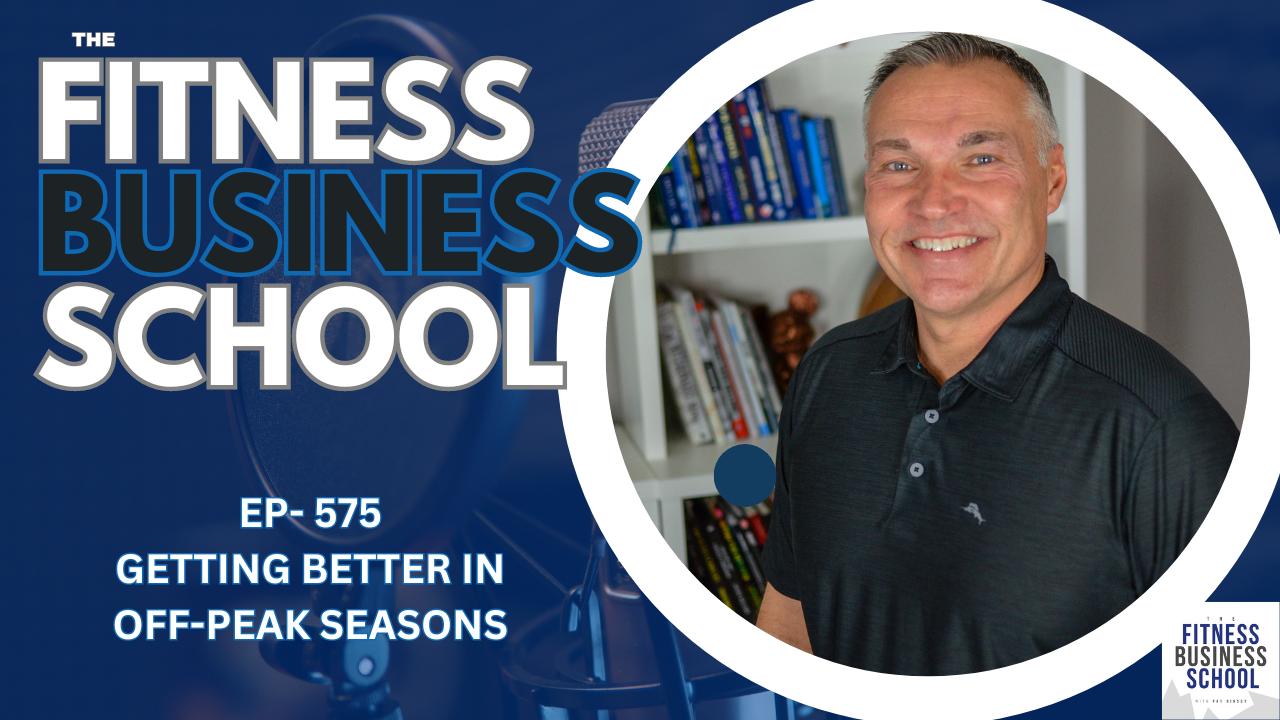Show Notes
00:00 Introduction: It’s Not Your Fault
00:52 The Unprepared Business Owner
04:44 Taking Responsibility as a Business Owner
06:34 Managing Ego and Embracing Humility
13:00 Seeking Solutions and Patching Potholes
17:01 Conclusion: Owning Your Outcomes
21:32 Special Offer: Ideal Business Diagnostic
Full Transcript
Hey, Pat Rigsby and here in today’s episode, we’re going to talk about how it’s not your fault. Let’s get to it.
Welcome to the Fitness Business School podcast, the show for fitness business owners who
want to grow their income, increase their impact and improve their lifestyle. Be sure to listen to the end
of this episode because we have a brand new special offer exclusive for listeners. So stay tuned.
When you’re dealing with little kids, you’ll hear that a lot. You’ll hear it’s not my fault. It wasn’t my fault. And I’ll even catch that in moments of weaknesses coming from adult business owners more than you might imagine and in truth there, there’s probably some validity to it, right?
It’s not your fault that. Your degree program, if you chose a degree related to the business that you currently own, didn’t really prepare you for a lot of what goes on as a business owner. Even if you had a business emphasis or even a business degree most business degree programs don’t do a great job preparing a small business owner for the challenges that are going to come their way.
Virtually all certifications missed the mark when it comes to preparing somebody for small business ownership. And in many ways the education system is pretty lacking when it comes to preparing people for business ownership in general. And that’s not a slight against education. Like many people, I have my own opinions about the good and bad about public education, private education, higher education, all of it.
But the point of this is not to kind of bag on them or to talk about things like certifications in a negative light. It’s just that if you pursued a career path and you didn’t know I know in my case, I thought, Hey, I want to go work in fitness. Make a career out of this. I didn’t know what I didn’t know.
And if you’re at all like me, then that probably was the case with you, right? Like you were just woefully unprepared for what was to come as a business owner. And you’re likely unprepared when it comes. You’re likely unprepared when it comes to management and leadership. You’re likely unprepared when it comes to navigating money and whether it’s business finances or personal finances.
And in many ways, you’re almost working from a deficit when it comes to accountability, because. School sports working as an employee always provide some sort of external accountability due dates and report cards and practices to attend and those sorts of things. And it’s very structured and there’s, trust me, there’s plenty of accountability as a business owner, but it’s not structured in that same way.
So it’s very foreign to us.
The reality is when you get into business in many ways, it’s not your fault because you’re going into uncharted territory for you unless you had the good fortune to have other sources of guidance and instruction or something coming up. If you have parents who are wonderful with money and guided you and taught you, then that filled some of those potential blind spots.
It’s a view. grew up in an entrepreneurial family and maybe you got to see how businesses were run and maybe the business was run really well. Maybe that fixed some blind spots. Now, interestingly enough for me, I grew up working in my dad’s garage and, I still didn’t dive into it cause I didn’t really connect the dots and it certainly, I didn’t enjoy a moment of working there.
And it wasn’t something that I took a particular interest in studying. So maybe it isn’t your fault that you came into business ownership fighting uphill, if you will. But, It’s your responsibility now. And that’s a big leap for a lot of people who have had very defined guard rails as to what their professional responsibilities were along the way.
If you’ve worked for somebody else, then you have a job description and the job description. is rarely, Hey, it’s all your responsibility. The buck stops with you for everything. And if you lose sight of that, cause a business owner. You’re responsible for everything from driving clients into the business to retaining the clients you have, to making sure taxes are paid, to making sure that you’ve got health insurance and you’re funding retirement.
All of that falls to you. And so much of that in many work environments were managed. Outside of you. And so it’s a big step or even a giant leap in many cases to take responsibility for the vast number of moving parts that come along with small business ownership. So the stuff I want to talk about today and in this episode is really about making that shift and taking personal responsibility.
And I will tell you that one of the key steps in taking personal responsibility as a business owner and accepting that you own it. There are no buts, there are no qualifiers. As a business owner, you own all the outcomes. One, one of the key steps is you’ve got to manage your ego and be more humble, I think, as a business owner, because failure and struggle and challenge is inevitable in business.
You may be wonderful at certain areas and you’re going to have struggle or blind spots and others. You may have periods of great growth, and then you’re going to have other periods of stagnation. You may have previously worked in environments where. You were a rock star because you got to play entirely to your strengths and Now some of the areas that you’re not as strong kind of get exposed and so you have to be humble and accept that that’s just part of the deal.
Part of the deal of business ownership is challenge is struggle. And our objective is to find ways to minimize the valleys and minimize the challenges while maximizing the peaks and making them more frequent or more, more steady. And I think a lot of that comes with humility and some of the humility is understanding that.
Even the best business owners have bumps in the road. I think that it doesn’t take much research to see how many people that are viewed as business icons had businesses that initially failed, or they filed bankruptcy or something like that along the way. And that’s just, part of it. I think that the great business owners that I know are people with a strong sense of perseverance and it’s just a non negotiable if you’re looking for, if you’re looking for the easy road, business ownership usually is not that.
Now, if you want to be successful and if you’re willing to take personal responsibility, immediately things are going to get. easier for you because you’re going to shift away from acting like a victim. You’re going to shift away from acting like you’re a pawn and everybody else’s game or something like that.
And you’re going to focus on the things that you can’t control. And to be fair, there are plenty of things in business and life that are beyond your control. But until you’ve, Take an ownership of the things that you can control or in those larger, more complex things, the pieces that you were in control of until you’ve done great work in those areas.
You probably shouldn’t spend a disproportionate amount of time worried about the things that you have no control over. So how do we make the shift? How do we go from this? Hey, it’s not my fault mentality and kind of maybe an inadvertent victim mentality to taking responsibility and giving yourself the foundation to succeed as a business owner.
I think there are three, three steps that that I look at that, that have to be the on ramp. The first is. Just that acceptance that I am going to take responsibility for all of it. I am going to be the person who says the buck stops with me. Even when I have to tell people, Hey, that’s my fault.
It’s on me. I made a mistake. The plan I had didn’t work. The thing that we did wasn’t good. And sometimes it, it’s no fun because maybe somebody that. works on your team, didn’t show up for a session on time or delivered a service or an experience in a way that’s not reflective of the way you want that to be reflective of your business.
And the thing about ultimate responsibility here is you hired them and you’re the one who was responsible for preparing them. So if they didn’t do it, we can trace it back to you because it’s your business and same thing when it comes to retention, maybe not being what you want or the pipeline for leads not being filled.
It’s not that there aren’t any other co conspirators. It’s that it’s your business. So you chose the co conspirators or you design the message or you handed the responsibility for designing the message off to somebody else. It’s one of the things that, that I talk about a lot with clients, they’ll hire an ad agency.
And it’s almost like they want to absolve themselves of the responsibility of any of the advertisement stuff because they paid somebody a fee. And I think of it just like having an employee, even though they’re not an employee, they’re an outside vendor. It’s your business. It’s representing you. So you have to be the one in control of the message.
You are. The person that is hiring them because maybe they’re well equipped to execute and Disseminate your message get it in front of the right people in the right format But if you’re handing over the reins to create the message then you’re handing over what type of person if any the Advertising brings in and that’s not you taking responsibility.
So just in a practical sense. Just step one is taking responsibility for all of it. And that means taking the bad with the good. It means taking the struggle with the success. So if you do that, if your default setting is it’s on me, and that doesn’t mean you have to be the doer of all things, but you are the person who has to ensure that all things get done.
The second is seeking solutions and that’s a step to, I think, seeking solutions. Like I said, inevitably, you’re going to have challenges. You’re gonna have problems. If you want to improve, you have to continually. Be seeking solutions because business is never a finished product. One of the things that I probably laugh about most is this I’ll be happy when mentality where people think that magically when they get a certain set of systems installed or a certain amount of gross revenue hit, or a certain number of clientele reached that all their problems magically go away.
And it’s just not the case. It, you’re trading challenges, you’re trading problems. The challenges that maybe you have as an early stage business maybe are more tied to you being able to compensate yourself well enough to justify what you’re doing at a larger scale, higher revenue business. It may be.
The management of people, the management of more moving parts, but you’re always going to have challenges because it’s a complex endeavor. And it involves a lot of human beings, either as team members or vendors or clients and humans are a flawed species. So we, you’re just signing up for that.
And if you fight that going in, you’re going to be, you’re going to be pretty miserable. So you have to be the person who is continually seeking solutions. How do I fix this? How do I improve that? How do I. moving forward towards whatever I want this business to be. And then the third step is complimentary to the second step and it’s, you need to patch your potholes.
And what I mean by that is if you are somebody who personally really thrived on scholastic structured accountability, or you did well with having deadlines and accountability in your previous career your school aged years or something like that, then you need to be self aware enough to know where your weak spots are, where your blind spots are, and you need to be able to fix them.
If you’re not great with, Bookkeeping, then you need to hire a bookkeeper. If you don’t have the capacity to do certain things, you need to hire people to do that. You are ultimately responsible for everything getting done. Again, it doesn’t mean you have to be the doer of all things. And a lot of people.
Understand that at a surface level, they think, okay, I don’t have the capacity to train more clients. So I need to delegate training some clients, or I don’t have the bandwidth to do both training and administrative work and training pays better. So I’m going to delegate administrative work, but are you doing the same thing?
With other areas, are you doing the same thing, whether it be copywriting or whether it’s accountability where you’re creating external accountability? One of the things that I did along the way was engage in some external accountability. To compliment my use of a planner or something like that. But if time management or planning is your issue, if that’s your pothole, you need to patch it.
If you keep saying I just need to get a handle on my time or I need to be better with this or that, then it’s your responsibility to, to fix it. So again, to wrap this up, sure. Getting into business, there are areas that you may be unprepared. I know I was, I probably got into business. Really unprepared for about half of it part of it.
I think I was pretty comfortable with I was as a college baseball coach and as a strength coach for a host of sports I was Prepared to create programs. I was prepared to assess people To, to manage multiple clients simultaneously. I had assistant coaches. I was comfortable with managing a team I had recruited.
So I was comfortable with pieces of the sales process, at least knowing that I needed to get leads and follow up the actual mechanics of closing sales took a little bit because I had some personal money hangups because I had just not come from an affluent place, but when it came to a lot of the things like on the behind the scenes stuff, those were not areas that I felt like I was strong.
I didn’t, I certainly wasn’t great at managing the financial side of things, some of the administrative stuff. On a college baseball setting, there was secretaries and there was, there were administrators that played parts in. A lot of that, that I had support that all of a sudden I’m flying solo on.
You have to accept what your blind spots are, what your weak areas are and say, okay, how do I address this? Because it doesn’t go away just because I don’t like it. That doesn’t mean that you can’t find ways to, to outsource it or delegate it, but it’s still, it has to run. The standard is the standard. And you’ll hear me say that a lot.
I. It’s like paying taxes is a business owner, whether you like doing it or not, doesn’t mean that it’s still not there. I think it things not being your fault. It there, sure. There may be some validity to it, but it’s your responsibility. You chose this, you chose to be a business owner. And one of the keys to owning your ideal business, I think is really leaning into personal responsibility.
For me there was a lot of peace in that. There was a lot of internal peace knowing that man, if this doesn’t go the way that it needs to go, the place I need to look first is in the mirror and coming from a position where, you know, when I was coaching in college, there, there are a lot of, Restrictions and constraints and things and navigating a college setting at the university that I coached at, there was a a structure, the way they would design budgets, especially for sports that were not giant revenue driving sports.
It didn’t matter if I carried a bigger roster. It didn’t matter. Like we won, we went to the world series one year, our soccer team One zero conference games. The next year, our budgets were exactly the same as one another’s. Even though my roster was twice as big, our softball team that carried roughly 25 percent as many people as I did, got the same budget, got the same amount of scholarships.
And for me, that sort of stuff, that was the opposite of what I wanted. I wanted to say, okay, If I work harder, if I do better, I want to be graded on my performance. I want to own the outcomes and I’m okay with however that goes. And that’s business ownership. So if that’s something that excites you understand that you don’t just get that when it goes well, you don’t just get the accolades.
If you perform at a high level, you have to own all of it. And. If that’s something that you do get excited about, if that’s something that you do feel like Is the type of career journey or professional life you want to have, then the like simplest, maybe best advice I could give you is, it may not be your fault.
It is your responsibility.
Thanks for listening to this episode of The Fitness Business School.
Before you go, I have a quick announcement:
One of of the things that we’ve been doing with our current clients is taking them through this Ideal Business diagnostic and really what it is, this checklist that allows you to pinpoint exactly what your business needs next so you can keep improving, keep growing, and build a business that you love to own, one that pays you well, one that allows you to have the impact you wanna have and one that allows you to have a lifestyle that you truly enjoy.
In this diagnostic, we walk through everything and we do an evaluation and can instantly pinpoint what you need to do next to build that business that you want. I’m going to extend this opportunity to get on with either me or my team and take you through this evaluation and fix your business’s most vital needs fast.
So if we take you through this, you’re gonna be able to make those vital changes that you need to finally have what I call your Ideal Business. If you’d be interested in going through this entirely free, risk-free diagnostic with us and learn what you already have in place, what you’re doing well and where are your greatest opportunities for rapid improvement are just shoot me an email with diagnostic in the subject line to [email protected].
Again, an email to [email protected] with diagnostic in the subject line will get
you scheduled and take you through this evaluation to help you build the business you want.







